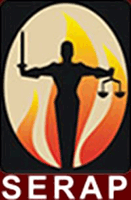
Membership Type: National Member Organisation
Website: www.serap-nigeria.org
Email: info@serap-nigeria.org
Telephone: +2348160537202
Full Address: 2b, Oyetola Street, off Ajanaku Street, Salvation bus stop, Opebi, Ikeja, Lagos State, Nigeria
Region: Sub-Saharan Africa
Organisation Contact Name: Joke Fekumo (Senior Legal Adviser), jokefekumo@serap-nigeria.org
Organisation Mission
Commensurate with its name (Socio-Economic Rights and Accountability Project) and its expertise SERAP focuses specifically on economic and social rights in Nigeria and on anti-corruption work, addressing all four areas where change is needed:
We are dedicated to promoting transparency and accountability in the use of Nigeria’s natural resources. We believe that Nigeria’s large natural resource base should be used to meet the basic needs of its population. We are committed to increasing the legal protection for internationally recognized economic, social and cultural rights, and to securing respect for these rights.
The organization aims to use human rights law to encourage the Nigerian government and others to address developmental and human rights challenges such as corruption, poverty, inequality and discrimination
How is your organisation involved in the Coalition?
Among others, through proactive and reactive work in Nigeria on the areas covered by the UN Convention against Corruption; sharing information among Coalition members about SERAP work and other relevant documents for the fight against corruption; working and partnering with members of the Coalition; and participation in the meetings and conferences sponsored or supported by the Coalition.
What do you find most exciting about UNCAC work?
The area of Asset Recovery and the process of progressive development of international accountability of states for corruption.
What, if any, UNCAC related activities have you been involved in?
Most of SERAP’s work relates either directly or indirectly to the substantive scope of UNCAC. To that extent, SERAP has been very much involved in UNCAC-related activities. These activities include:
SERAP v Nigeria: Following discovery of massive and systemic corruption by public officials, SERAP petitioned the International Criminal Court’s Prosecutor in The Hague in 2008 asking him to use “his position and powers to examine and investigate whether the systemic/grand corruption in Nigeria amounts to a crime against humanity within the jurisdiction of the ICC, and to prevail on the Nigerian government to fulfil its obligations to effectively and fairly investigate and prosecute all allegations of grand corruption since 1985″. The petition was widely covered in the media. The petition is still pending before the ICC.
SERAP v Nigeria: Following the discovery that $16 billion budgeted for supply of electricity to millions of Nigerians was stolen or mismanaged, SERAP in 2009 sued the government in court “over the failure to effectively tackle corruption in the power sector, which has resulted in the theft of $16b meant for the power projects, and the denial of access to reliable and uninterrupted electricity services for majority of Nigerians,” arguing that “without access to improved quality and quantity of electricity services, Nigeria cannot achieve the Millennium Development Goals (MDGs), including eradicating extreme poverty and hunger; achieving universal primary education; reducing child mortality; combating HIV/AIDS, malaria, and other diseases.” The case is pending before the court.
SERAP v Nigeria: This suit filed in 2011 before the Federal High Court in Ikeja alleged the “failure of the government to release information and documents on the spending of recovered stolen funds.” In the case, SERAP argued that “the disclosure of the information requested will give the general public a true picture and a clear understanding of how the spending of recovered public stolen funds have impacted on the lives of the poor and indigent and other disadvantaged Nigerians.”
SERAP has successfully obtained the court’s permission to sue for the release of documents on the spending of recovered stolen funds since the return of civilian rule in 1999. The order has now cleared the way for SERAP to advance its case against the government. The order for leave for an order of mandamus was granted against the Accountant-General of the Federation, Jonah Otunla, and the Attorney-General of the Federation, Mohammed Adoke. The case, which is seeking several declaratory reliefs, is still pending in court.
Prof. Dr. Peter Eigen, founder of Transparency International hailed SERAP for instituting the case and for obtaining the court’s order when he wrote: “Excellent work, SERAP! Please keep me informed of further development in the case.”
Training magistrates and support staff on anti-corruption laws and standards: Another core area of our work is to improve the justice delivery system in the country in terms of it being corruption-free and accessible to the citizens. For example, with the support of the Royal Netherlands Embassy in Abuja, SERAP successfully carried out anti-corruption and ethics training and sensitisation seminars for 200 magistrates and support staff in Lagos State. SERAP has also researched, drafted and produced a 14-point programme for promoting ethics and integrity at magistrates’ courts level. This publication has been widely distributed among magistrates and support staff in Lagos State, and among the general public.
Another element of our magistrate court anti-corruption project is a media roundtable where lawyers, judges, parliamentarians, civil society leaders and other stakeholders discuss problem of corruption in the justice delivery system and propose strategies for addressing the problem.
What UNCAC related activities/work are you most looking forward to?
- Reforming of anticorruption institutions and agencies
- Ending impunity for large-scale corruption especially encouraging the new government in Nigeria to prosecute outstanding cases of corruption
- Asset recovery, including repatriation of stolen assets and promoting the transparent and accountable use of recovered assets
- Education and capacity building for government ministries and agencies on UNCAC and other relevant anticorruption treaties and standards
- International accountability for corruption including the establishment of the International Anticorruption Corruption Court.
- Addressing private sector corruption especially those involving multinational cooperation
- Effective remedies for victims of corruption
Quote
“Recognising the unexplored potential of international human rights law for increasing transparency, accountability, and protection of economic and social rights in Nigeria”




(6) Feedback
Comments closed.
Please allow approximately 24 hours before comments are approved.